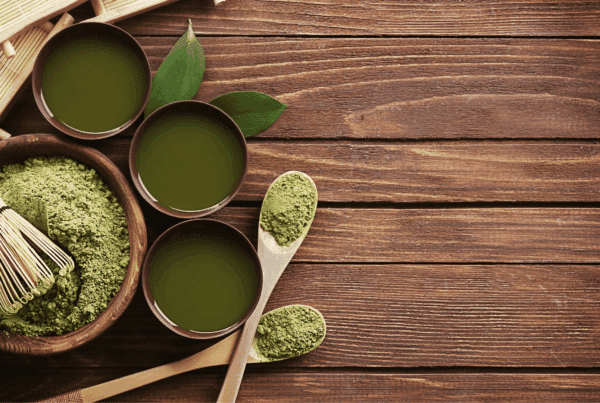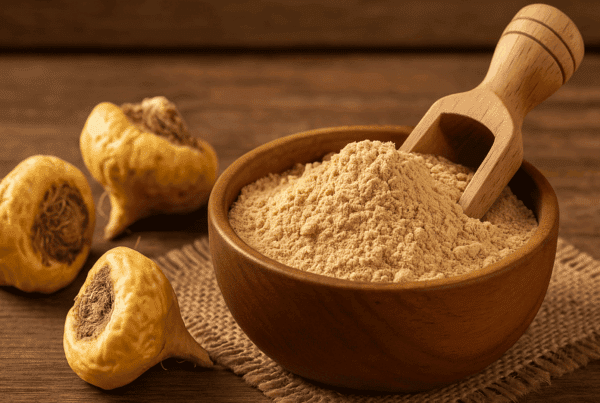Why is mental health more important than ever?
Mental health is critical to daily functioning, but many today face challenges such as stress, anxiety and low energy. A busy lifestyle, balancing work and personal commitments, as well as unpredictable challenges can lead to mental exhaustion.
While there are many methods for improving mental health – from physical activity to meditation – it's important to know that diet also plays a key role. The food we eat can directly affect our mood, energy levels and ability to cope with stress.
The good news is that certain foods can significantly contribute to feelings of calmness and better mood. They contain nutrients that support brain function, reduce stress levels and help stabilize mood. In this text, we will discover what these foods are and how to easily include them in your daily diet.
Whether you're looking for a way to deal with stress or want to increase your focus and concentration, these simple and delicious ingredients can help you feel better from the inside out. Join us as we explore how food can be your ally in maintaining mental health!
Foods that positively affect mental health
Food can be a powerful ally in maintaining mental health. Research shows that certain foods directly affect the brain and emotional well-being, thanks to their specific nutrients. Below, we discover how some of these foods help maintain calmness, stability of mood and better mental focus.
1. Nuts and seeds: Brain support and mood stability
Why are they useful?
Nuts and seeds are real mines of nutrients that have an extremely positive effect on mental health.
- Omega-3 fatty acids: It has been proven that these fats they support brain function and reduce inflammatory processes which can contribute to mood swings.
- Magnesium: This mineral helps to relax muscles and reduce stress, while at the same time contributes to the stability of the nervous system.
- Tryptophan: An amino acid that contributes to the production of serotonin, known as the "hormone of happiness".
How do they affect mental health?
Research has shown that regular consumption of nuts and seeds can help reduce symptoms of anxiety and depression. Omega-3 fatty acids from walnuts and flaxseed oil help maintain the elasticity of brain cells and improve communication between neurons. Magnesium additionally supports the production of serotonin, which results in a more stable mood and better sleep.
How to use them?
Add a handful of walnuts or almonds to your morning oatmeal.
Make protein balls with flax seeds and walnuts.
Sprinkle the seeds over the salad for extra crunch and nutritional value.
2. Dark chocolate: Antioxidants for a good mood
Why is it useful?
Dark chocolate contains a high level of flavonoids, which improve blood circulation in the brain, increasing the flow of oxygen and nutrients.
- Flavonoids: They reduce oxidative stress and help prevent neurodegenerative diseases.
- Endorphins: Eating dark chocolate stimulates the production of endorphins, natural feel-good chemicals.
- Theobromine: A mild stimulant that can improve concentration and mental alertness.
How does it affect mental health?
Dark chocolate can help reduce levels of cortisol, the stress hormone. Thanks to its antioxidant properties, it protects brain cells from damage caused by stress. Also, due to the presence of tryptophan, it contributes to the production of serotonin.
How to use it?
Sweeten your day with a cube of sugar-free dark chocolate.
Make a quick dessert with chopped fruit (bananas, oranges, berries) and cover with melted dark chocolate without sugar.

3. Fermented products: Support for intestinal flora and mood
Why are they useful?
Fermented products contain beneficial probiotics that support healthy intestinal flora. As around 90% serotonin is produced right in the gut, a healthy microbiome is crucial for emotional stability.
- Probiotics: They help maintain the balance of intestinal flora.
- B vitamins: Fermentation often increases the level of B vitamins, which are important for the function of the nervous system.
How do they affect mental health?
Studies show that people with healthy gut flora have a lower risk of depression and anxiety. Fermented products improve digestion, reduce inflammation and promote better absorption of nutrients.
How to use them?
Take a glass of kefir with breakfast.
Drink. kombucha instead of juice.
4. Foods rich in vitamin B: Energy and mental clarity
Why are they useful?
Vitamins of the B group support the metabolism of carbohydrates, proteins and fats, thus providing energy.
- B6, B9 and B12: They directly affect the production of neurotransmitters such as dopamine and serotonin.
- Folic acid: Helps reduce fatigue and exhaustion.
How do they affect mental health?
A lack of B vitamins can cause low energy, low mood and problems with concentration. By including these vitamins in your diet, you increase mental clarity and reduce feelings of exhaustion.
How to use them?
Add spirulina in your morning smoothie.
Make a salad with boiled eggs and spinach.

5. Green tea: Calmness and focus in one cup
Why is it useful?
Green tea contains L-theanine, an amino acid that contributes to relaxation without causing drowsiness. It helps improve concentration and reduce stress levels.
How does it affect mental health?
L-theanine improves brain activity and balances cortisol levels. This effect allows for calmness with increased mental alertness.
How to use it?
Drink green tea in the morning for a focused start to the day.
Prepare iced tea with lemon as refreshment.
6. Turmeric: Natural antidepressant and protector of the brain
Why is it useful?
Turmeric is known as a powerful natural medicine because of its active ingredient curcumin. Its anti-inflammatory and antioxidant properties make it ideal for preserving mental health and protecting brain functions.
- Curcumin: It helps to reduce inflammatory processes in the body and brain, which can contribute to the prevention of neurodegenerative diseases.
- Antioxidants: They protect brain cells from oxidative stress, which can contribute to depression and mental fog.
- Increases the production of BDNF (nerve cell growth factor): This may contribute to the preservation of cognitive functions.
How does it affect mental health?
Regular consumption of turmeric can help reduce symptoms of anxiety and depression. Studies have shown that curcumin can have a similar effect to antidepressants in people with mild symptoms of depression. Also, its ability to reduce inflammation in the body can have an indirect positive impact on mental health, as inflammatory processes are often associated with mood disorders.
How to use it?
- Golden milk: Heat vegetable milk (e.g. almond milk), add a teaspoon of turmeric, a little cinnamon and a pinch of black pepper (for better absorption of curcumin).
- Additive in dishes: Add a pinch of turmeric to soup, sauce or rice for added color and nutritional value.
- Smoothies: Add half a teaspoon of turmeric to a smoothie with banana and vegetable milk.

How to support mental health with daily nutrition?
Mental health is directly related to our daily food choices. What we put into our bodies can significantly affect our mood, energy levels and ability to cope with stress. In order to maintain balance, it is necessary to choose foods wisely and take care of key aspects of nutrition.
1. Balance your meals: Combine protein, healthy fats and complex carbohydrates
One of the most important steps to maintaining mental health is getting the right combination of macronutrients in each meal. When proteins, fats and carbohydrates are in balance, the brain receives a stable source of energy, which helps maintain concentration and mood stability.
Why is balance important?
- Proteins: Amino acids from protein (like tryptophan) are key to the production of serotonin, a neurotransmitter that contributes to feelings of happiness.
- Healthy fats: Omega-3 fatty acids from nuts, seeds and flaxseed oil support the elasticity of brain cells and reduce inflammation.
- Complex carbohydrates: They gradually release energy and help stabilize blood sugar levels, reducing sudden mood swings.
Example of a balanced meal:
- Breakfast: Oatmeal or smoothie with chia seeds, fresh fruit and a scoop of protein powder.
- Lunch: Salad with chicken, quinoa, avocado and cold-pressed linseed oil dressing.
- Snack: A handful of nuts and a piece of sugar-free dark chocolate.
- Dinner: Grilled salmon with roasted sweet potato and vegetables with a little turmeric.
Balance tips:
Always combine protein with fiber and healthy fats to avoid sudden changes in blood sugar.
Avoid simple sugars, as they can cause a sudden spike in energy followed by a crash and a feeling of exhaustion.
2. Avoid refined sugar: Mood stability without sudden spikes in glucose
Refined sugar is quickly absorbed and causes a rapid rise in blood glucose levels. Although it provides a brief burst of energy, this spike is followed by a sharp decline that often results in fatigue, irritability, and mood swings.
Why is refined sugar problematic?
- Sugar spikes and drops: A sudden rise in glucose activates the secretion of insulin, which leads to a rapid drop in sugar and a feeling of exhaustion.
- Promotes inflammation: Excess sugar contributes to inflammatory processes in the body, which can negatively affect the brain.
- Increases anxiety: Research shows that people who consume more refined sugars are more likely to experience anxiety and depression.
How to replace sugar?
Sugar-free sweets: Use substitutes like erythritol or stevia.
Naturally sweetened options and healthy desserts: For example, raw bar with no added sugar can satisfy the need for sweets without disturbing the sugar balance.
3. Drink enough fluids: Hydration for better concentration and mood
Dehydration can have a significant impact on cognitive function and mental health. Even mild dehydration can cause headaches, loss of concentration and mood swings.
How does dehydration affect mental health?
- Reduced concentration: The brain consists of about 75% of water, so its deficiency directly affects the ability to think.
- Irritability: Low fluid levels can cause fatigue and emotional instability.
- Focus and productivity: When you are hydrated, the brain processes information more efficiently and maintains focus.
How to hydrate?
Start your day with a glass of lemon water.
Tea instead of soda: Green tea can also help calm you down and improve concentration.
Increase your intake of vegetables with a high water content: Cucumbers, zucchini, and peppers are great choices.
Supplement support: Natural help for calmness and mental stability
When the daily stress is too intense or you feel you lack energy, natural supplements they can be a useful support.
1. Mental Calmness
- What does it contain: L-theanine, known for reducing stress without causing drowsiness.
- How it works: It helps reduce anxiety, increases focus and calms the mind.
- When to use: Before a challenging meeting, after a busy day or before bed.
2. Stress Relax
- What does it contain: Natural plant extracts (like ashwagandha) that help reduce stress hormones.
- How it works: It improves mood, reduces tension and helps to restore the nervous system.
- When to use: In periods of increased stress or emotional burden.
Why use supplements?
Sometimes it is difficult to get all the necessary nutrients through food, especially when stress is at its peak.
These supplements are formulated to support the normal functioning of the nervous system and help balance mood.
Conclusion: Caring for mental health through nutrition
Mental health requires daily attention and care, but small dietary changes can have significant benefits.
By incorporating the right foods into your daily routine, you support not only your body, but your mind as well. Nutrient-rich foods can help reduce stress, improve concentration, and maintain a stable mood.
By choosing meals consciously and taking into account how food affects your mental state, we take an important step towards preserving inner peace and better emotional balance. Make your diet an ally in self-care and everyday mental well-being.









